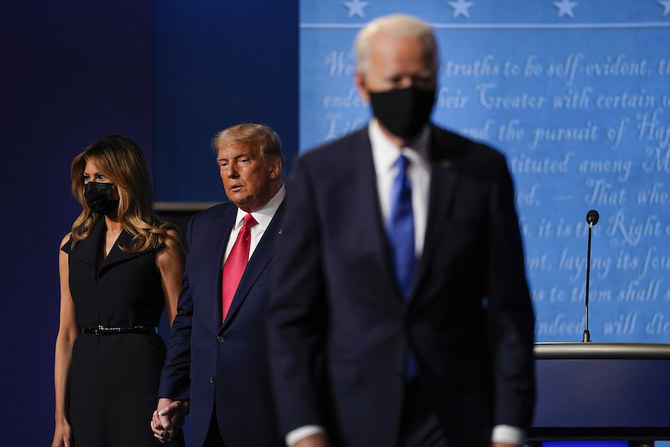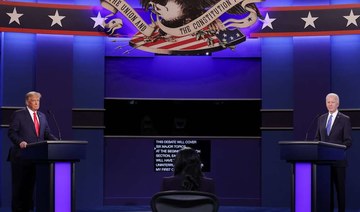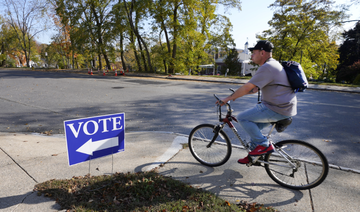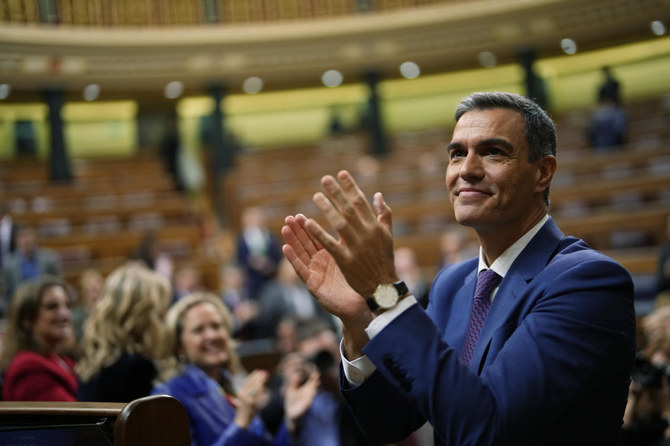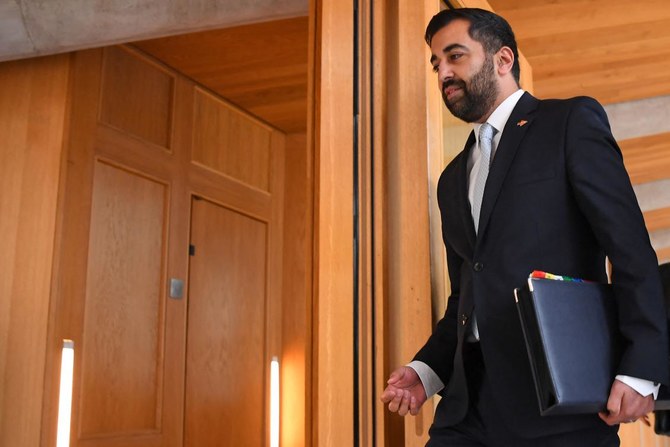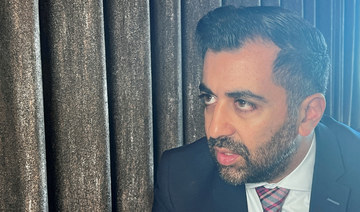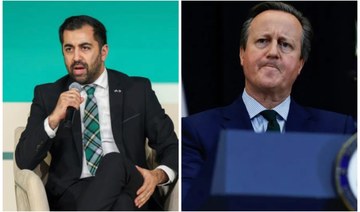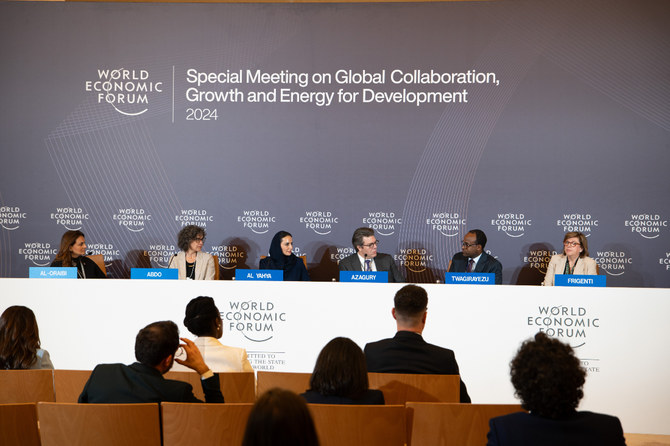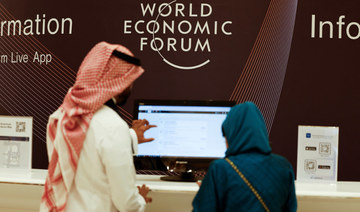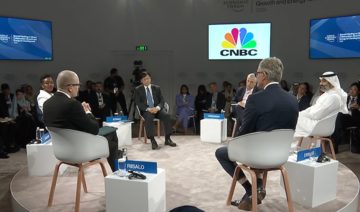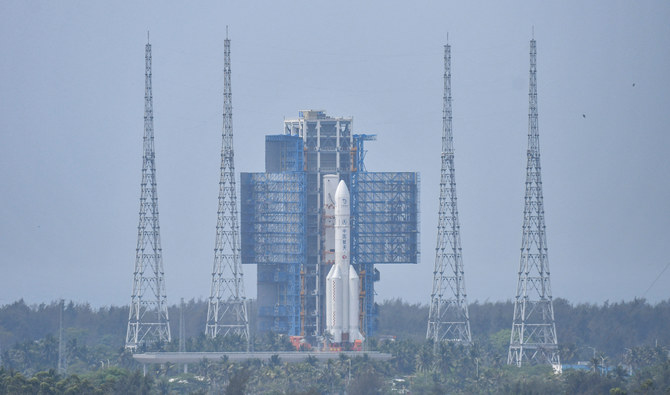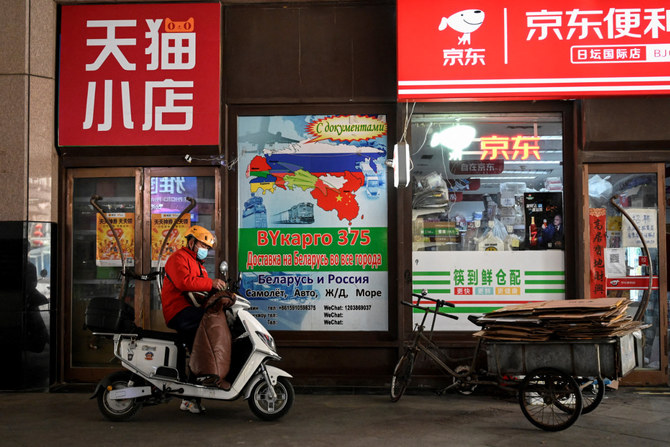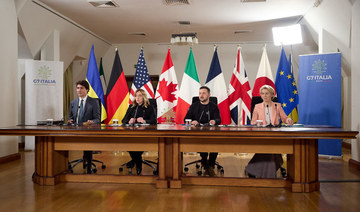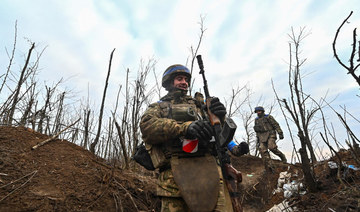NEW YORK: Joe Biden warned Iran would “pay a price” for interfering in the US election if he is elected president.
During a more orderly second debate with President Donald Trump Thursday, the former vice president looked to take the initiative on foreign attempts to influence voters.
Moderator Kirsten Welker asked Biden about revelations from intelligence officials that Russia and Iran had attempted to meddle in the election and obtained voter registration information.
“We know that Russia has been involved, China has been involved to some degree, and now we learn that Iran has been involved,” Biden said, “They will pay a price if I’m elected.”
(AFP)
John Ratcliffe, the director of national intelligence, said this week that Iran used the information to send threatening emails to voters in Florida. On Thursday, the US Treasury Department responded with new sanctions against five Iranian entities accused of spreading disinformation and division ahead of the election.
Biden’s warning to Iran would have rankled with Trump and his foreign policy team. The president has imposed a maximum pressure policy on Tehran by withdrawing from a 2015 nuclear deal and imposing tough sanctions.
Trump accuses the previous administration, in which Joe Biden deputized to Barack Obama, of allowing Iran to further its missile program and expand its militias across the Middle East.
On Russia, Biden said Moscow did not want him to get elected, because they know he would be tough on them.
“They know that I know them. And they know me,” Biden said.
Trump said: “There has been nobody tougher on Russia than Donald Trump.”
He accused Biden of receiving money from foreign companies.
“I have not taken a penny from any foreign source ever in my life,” Biden said, arguing that he had released all of his tax returns, unlike the president.
(AFP)
“Release your tax returns or stop talking about corruption,” Biden said.
While the second and final debate ahead of the Nov. 3 election was a calmer affair than the first one, it was laden with attacks.
The rules were different this time: microphones were muted for two-minute stretches to allow the other an uninterrupted answer.
Welker kept the contentious rivals under control, and made sure things were clear and organized at the venue in Belmont University in Nashville. She got the best reviews of the night.
A viewer tweeted: “Kristen Welker is putting on a master class in how to moderate a presidential debate.”
The two candidates squared off on foreign policy, the economy, race, healthcare, and climate change.
(AFP)
The debate kicked off with exchanges over the coronavirus pandemic, which has killed more than 220,000 in the US, where most states are seeing a dramatic resurgence of the virus.
Trump defended the way his administration handled COVID-19. “We closed up the greatest economy in the world in order to fight this horrible disease that came from China,” he said.
The president argued that the mortality rate has decreased and a vaccine would probably be ready before the end of the year.
“We’re rounding the turn. We’re learning to live with it,” said Trump.
“We’re learning to die with it,” replied Biden, who criticized the president for not having a plan to address the crisis.
“Anyone who’s responsible for that many deaths should not remain as president of the United States of America,” Biden said.
(AFP)
Pivoting to a report that the current administration could not locate the parents of more than 500 children detained at the border with Mexico and separated from their families, Trump said children are brought across the border by “coyotes and drug cartels.”
Defending his immigration policies, Trump said the border is now more secure than ever.
He said he is “trying very hard” to reunite children with their parents.
Biden called the Trump administration’s inability to locate the parents “criminal.” He said Trump’s family separation policy made America a laughingstock: “It violates every notion of who we are as a nation.”
The president then pressed Biden to answer “who built the cages” that were shown in media reports. Biden dodged the answer.
The cages were built in 2014 by the Obama administration.
Biden then promised, if elected, to put in motion reforms that would provide a pathway to citizenship, protected from deportation, for undocumented immigrants known as “Dreamers”. “We owe them,” Biden said.
Discussion heated up when Welker breached the race topic, as the country continues to contend with civil unrest over racial injustice and police brutality.
Biden said the US has “never, ever lived up” to the promise of liberty and equality for all, a principle upon which it was founded.
Trump said that, other than Abraham Lincoln, “nobody has done more for the Black community than Donald Trump.”
He attacked Biden’s support for the 1994 crime law, which critics say has led to mass incarceration.
But Biden turned to the camera and addressed voters directly: “You know who I am. You know who he is.”
Biden called the president a “racist” who “pours fuel on every single racist fire.”
(AFP)
“I think I have great relationships with all people. I am the least racist person in this room,” Trump responded.
Twelve days before the election, American voters were able to watch unfold two visions for the future of their country. It is hard to tell whether the candidates were able to broaden their appeal beyond their own bases and attract the undecided voters, whose numbers are shrinking by the day.
Millions of them are already standing in long lines outside polling stations, braving night and chilly temperatures, to cast their early, final votes.



